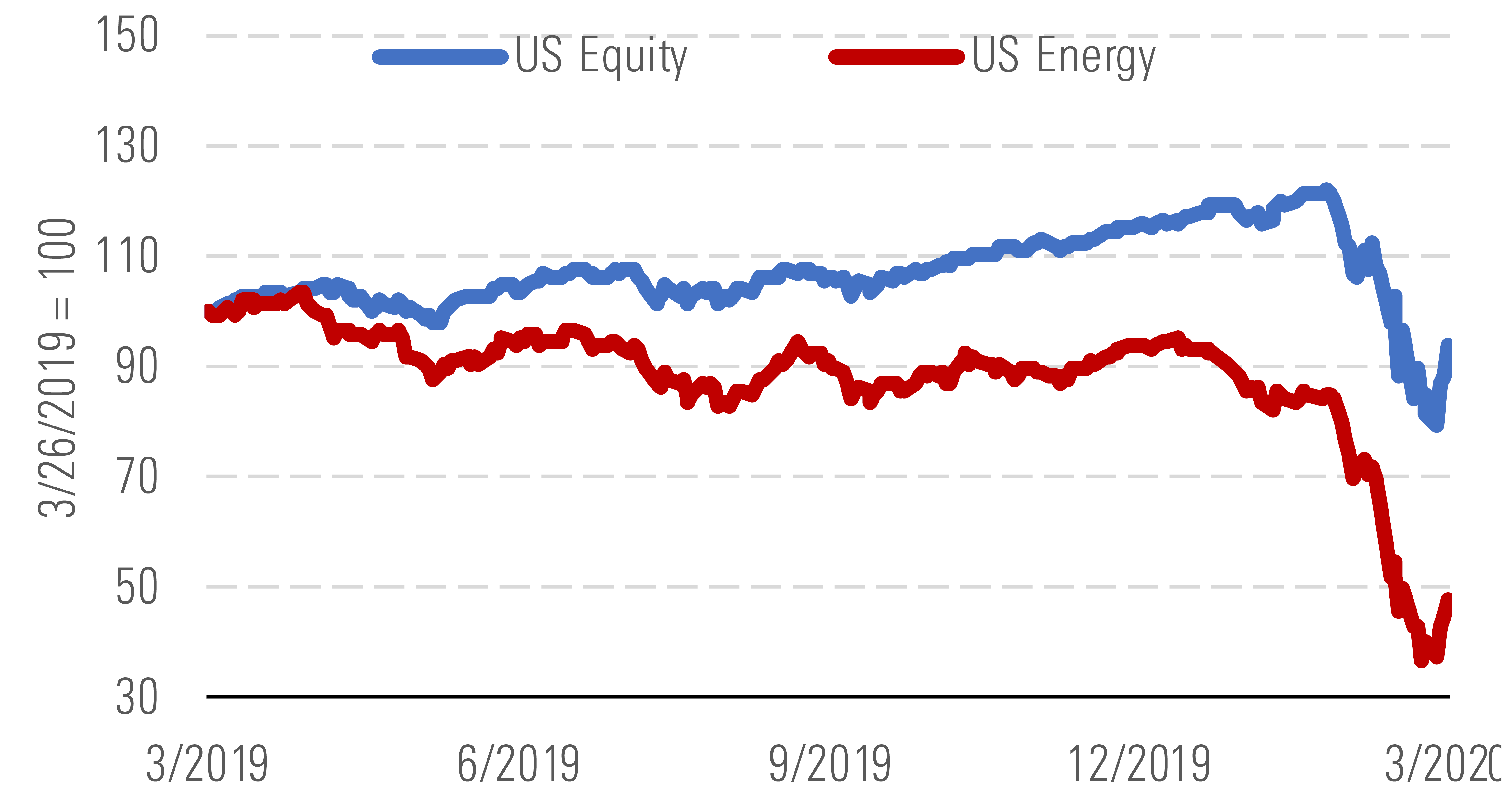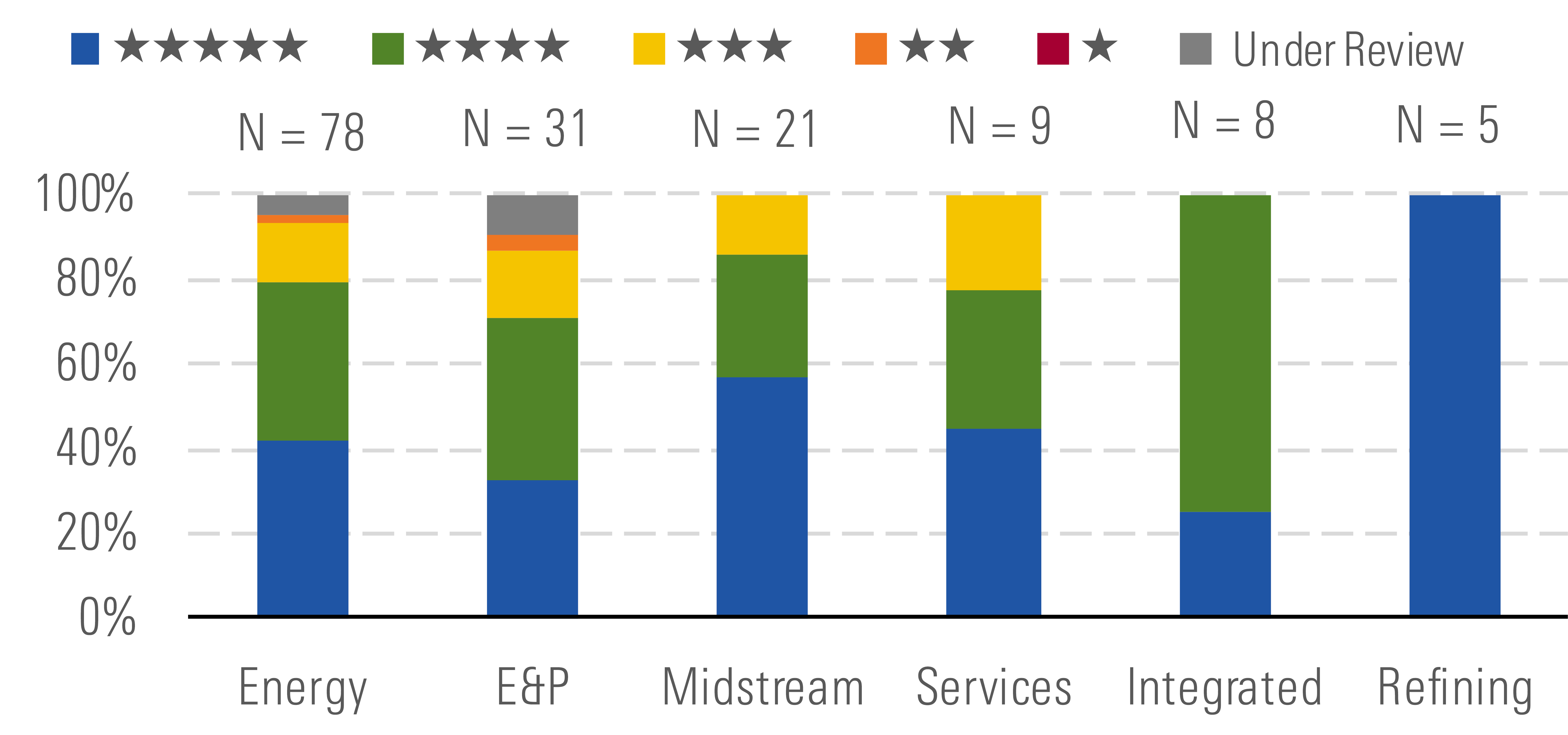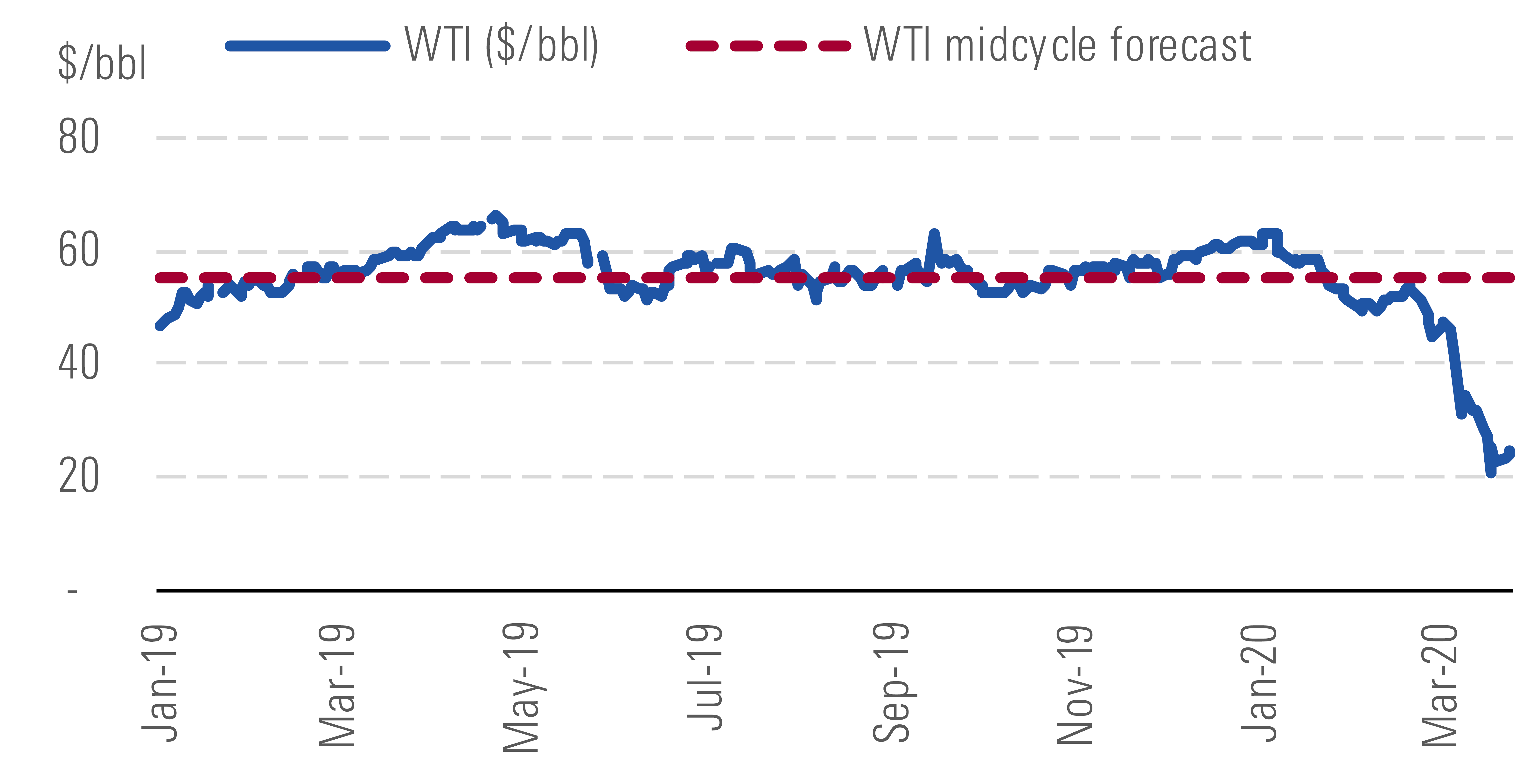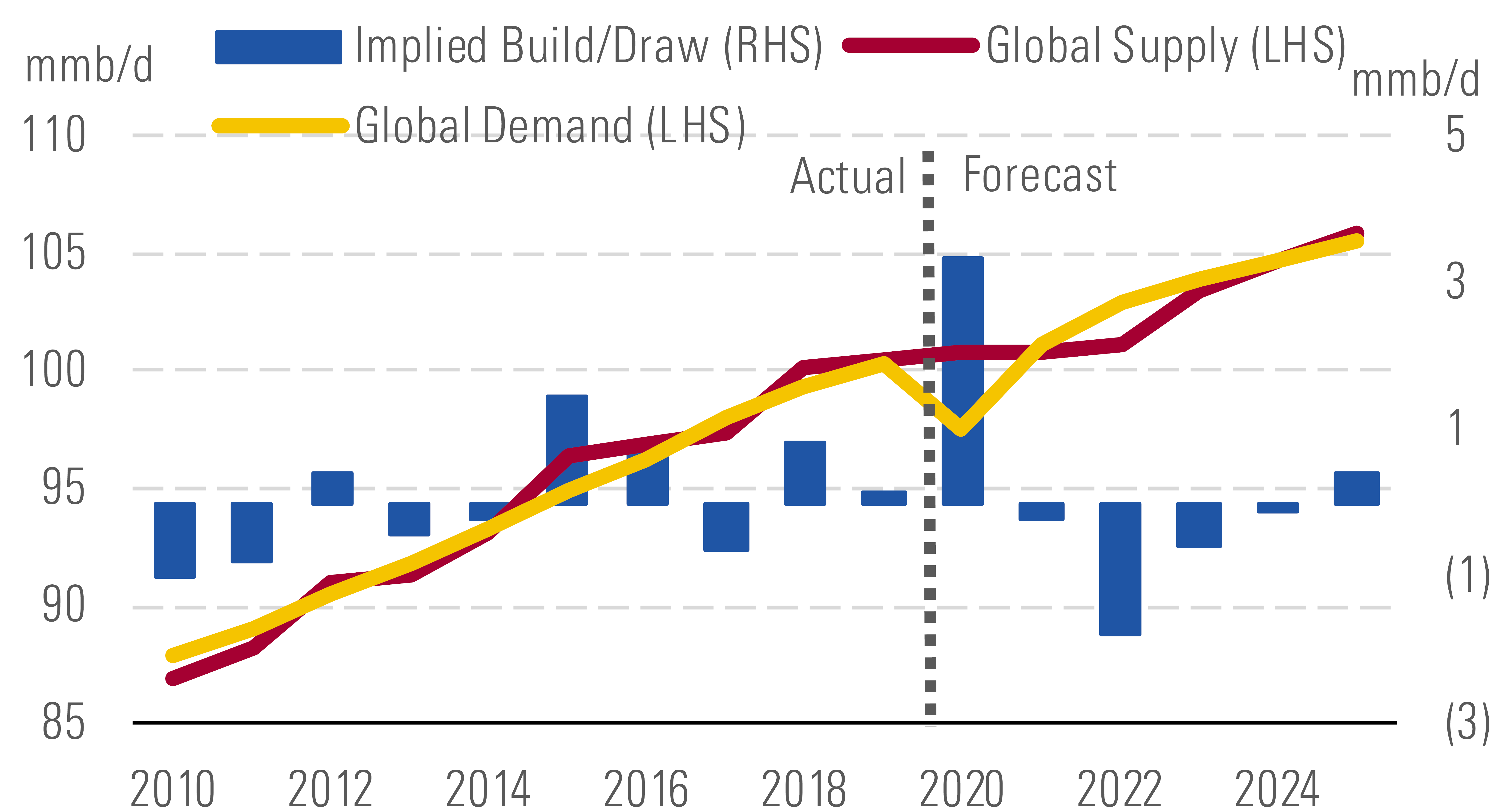Virus, OPEC+ Oversupply Fears Weigh Heavily on Oil Prices, Gouge Energy Stocks
Plenty of reason to worry, but we still expect a nearly complete recovery.
The energy sector has been particularly affected by global events in 2020 and sits in a precarious position heading into the second quarter. The Morningstar US Energy Index has trailed the overall domestic market on a quarterly basis, falling 49%, compared with a 19% decline for the overall market. The primary catalyst for the steep underperformance has been reduced demand related to the COVID-19 outbreak and concerns following a breakdown in OPEC+ production cuts with escalating production from Russia and Saudi Arabia. The West Texas Intermediate futures curve price estimate for 2020 has declined 60% since the beginning of the year as a result of a lethal combination of both a supply and demand shock.

U.S. energy index trails the market. - source: Morningstar
In the near term, investors have every reason to be worried. We project 2020 oil demand will fall 2.8 million barrels per day (2.8%), the largest single-year drop in nearly 40 years. Because oil producers cannot adjust overnight, global oil markets are likely to be oversupplied on the order of 3.3 mmb/d in 2020, which dwarfs the excess seen in the 2014-16 downturn.
However, we believe that long-run oil demand will be relatively unscathed by COVID-19 following a near-complete economic recovery, and we maintain our midcycle price estimates of $55/bbl WTI and $60/bbl Brent. Even after factoring in lower revenue in 2020 and 2021 due to depressed prices, we see vast opportunities as energy remains the most undervalued sector, trading at a 49% discount.

Energy stocks are steeply undervalued. - source: Morningstar
We see $55 as the fully loaded cost for the marginal barrel of oil that will balance global supply and demand in the long run. We expect this marginal barrel to come from a U.S. shale well, and the shale business model does not work in the current environment. Without a rebound in oil prices, producers will have no incentive to grow their production or even replace declines, resulting in a downward spiral for supply that could eventually turn the current glut into a shortage. Shale wells today are much cheaper on a per barrel basis than the large, complex megaprojects that would have set prices in a world without U.S. shale. Over the long run, we think U.S. shale well cost inflation will remain subdued, owing greatly to the no-moat nature of many shale services, and that wider adoption of current technologies coupled with decades of attractive drilling opportunities will contain unit break-evens.

Current oil prices are well below our long-term estimate. - source: Morningstar

Long-run oil demand will be nearly unscathed by COVID-19 - source: Morningstar
Top Picks
Schlumberger SLB Economic Moat Rating: Narrow Fair Value Estimate: $55 Fair Value Uncertainty: High
Schlumberger remains our top oilfield-services pick. Thanks to its strong balance sheet and focus on less-volatile international markets, we expect it to weather the storm facing oil markets over the next two years. In the long run, we think Schlumberger will benefit from secular growth in international capital expenditures. Also, we think the company is poised to gain market share and improve margins via its efficiency-boosting integrated project initiatives.
Enterprise Products Partners EPD Economic Moat Rating: Wide Fair Value Estimate: $25.50 Fair Value Uncertainty: Medium
Enterprise Products Partners is well positioned to deal with the coming industry downturn over the next one to two years. The partnership has liquidity of $6.4 billion compared with $2.3 billion in maturities through the end of 2021. 81% of its customer base is investment-grade or letter-of-credit backed. Further, as we expect capital spending plans to decline, Enterprise will have substantial excess cash after distributions and spending plans to allocate as needed, and leverage could be below 3 times by 2024. We expect the partnership's storage, petrochemicals, and natural gas pipelines businesses to help offset expected weakness in the oil and natural gas liquids side. Finally, we think Enterprise has an opportunity to accelerate unit repurchases while the stock remains deeply undervalued.
Enbridge ENB Economic Moat Rating: Wide Fair Value Estimate: $44 Fair Value Uncertainty: Medium
We see 40% upside in wide-moat Enbridge’s stock. We think uncertainty surrounding long-term Mainline utilization has made investors tentative. In our view, the market underappreciates the long-term cash flows from the Mainline. We anticipate that all three major pipeline expansion projects will be built by the end of 2022. This naturally creates concerns about the utilization of Enbridge's Mainline system. Even though producers look to cut capital spending, we still expect growth when crude prices reach our forecast midcycle levels. We think advancements associated with solvent-assisted technology will lower oil sands break-evens, leading to long-term Canadian production that will surprise to the upside and add 1.3 million barrels of oil per day over the next decade. Investors shouldn't expect Mainline underutilization to last long, as we expect it to operate near full capacity as supply ramps up to our forecast levels by 2026. Enbridge offers an attractive dividend, which is yielding 9.3% at current levels.
Data as of March 26, 2020.

/s3.amazonaws.com/arc-authors/morningstar/17f48ad3-acb4-4abc-982b-fb3b14ceda2f.jpg)
/cloudfront-us-east-1.images.arcpublishing.com/morningstar/PLMEDIM3Z5AF7FI5MVLOQXYPMM.jpg)
/cloudfront-us-east-1.images.arcpublishing.com/morningstar/I53I52PGOBAHLOFRMZXFRK5HDA.jpg)
/cloudfront-us-east-1.images.arcpublishing.com/morningstar/CEWZOFDBCVCIPJZDCUJLTQLFXA.jpg)
:quality(80)/s3.amazonaws.com/arc-authors/morningstar/17f48ad3-acb4-4abc-982b-fb3b14ceda2f.jpg)